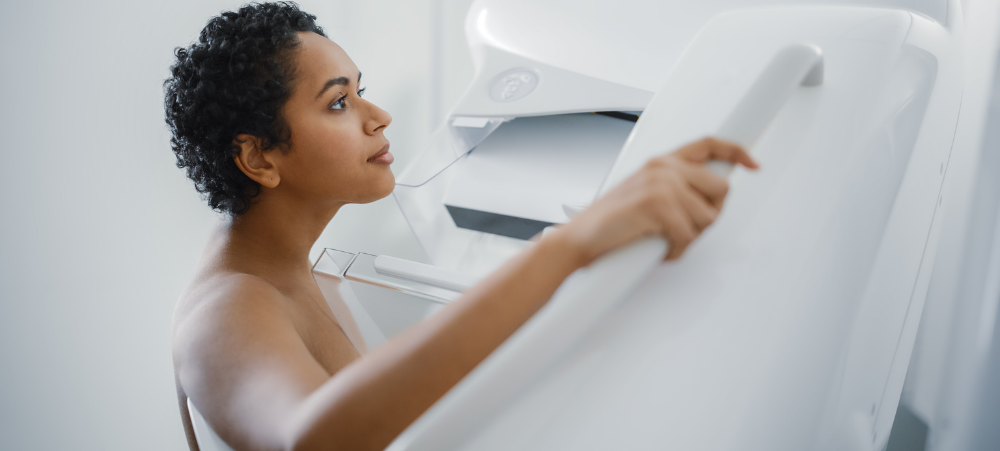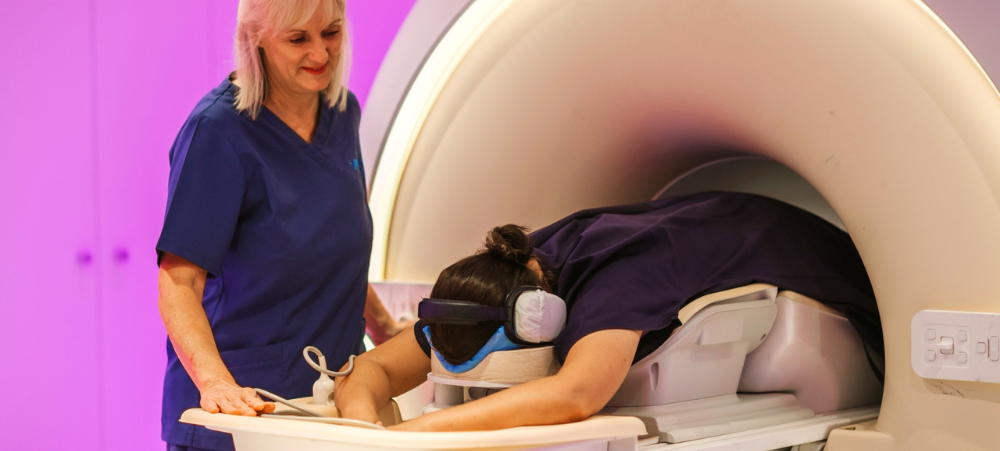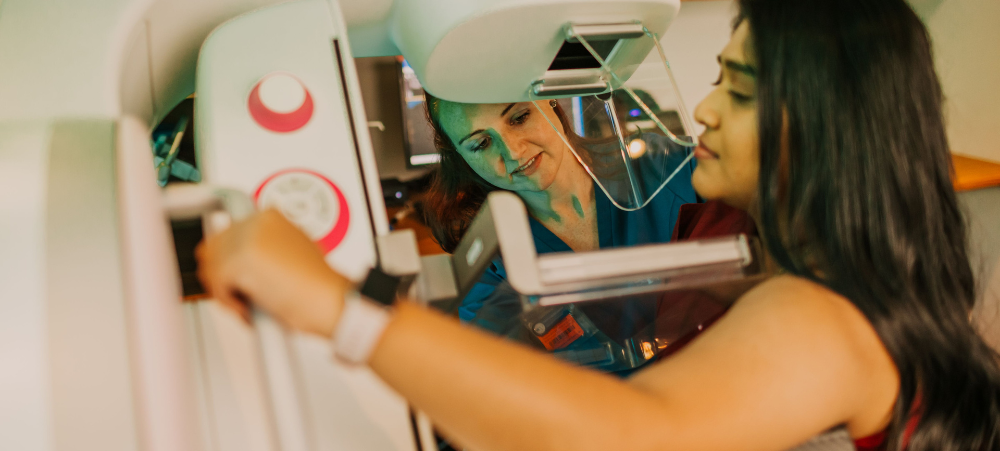‘When it comes to breast health, knowledge really is power,’ says Dr Salomine Theron, radiologist and head of the Tygervalley Mammography Centre at SCP Radiology. ‘Many women still have questions about their personal risk, the role of mammograms and what different tests can and can’t show. We’ve put together these frequently asked questions to give women clear, practical answers – and hopefully some peace of mind too.’
1. Does breast cancer run in families?
Yes. But most cases aren’t hereditary. Around 5-10% of breast cancers are linked to inherited genetic mutations. The most well-known are BRCA1 and BRCA2. If a close family member has had breast or ovarian cancer, especially at a young age, it’s worth talking to your doctor about your risk. ‘A family history doesn’t guarantee you’ll get breast cancer but having no history doesn’t mean you won’t.’
2. What can increase your risk of developing breast cancer?
Age, hormonal factors (like early menstruation or late menopause), obesity, alcohol and not having children (or having them later in life) can all increase your risk. But sometimes there’s no clear reason, which is why screening is so important. A mammogram can pick up breast cancer before any symptoms develop and detect a tumour that cannot be felt. It is effective for detecting early cancer in women over 40.
3. Is it true that breast cancer is more treatable if caught early?

Absolutely. If detected early, there is a survival rate of over 90%. The later it’s found, the harder it is to treat. That’s why routine screening, even when you feel perfectly fine, can save your life.
4. What tests are used to detect breast cancer?
- Mammogram: The frontline screening tool for women over 40.
- Ultrasound: Often used to check lumps in younger women or those with dense breast tissue.
- MRI: Used for high-risk patients or complex cases.
- Biopsy: The only way to confirm cancer, by removing cells for testing.
5. Are all breast cancers the same?
No. Breast cancer isn’t one disease, there are several types, including ductal, lobular, triple-negative and HER2-positive cancers. They behave differently and respond to different treatments.
6. Can men get breast cancer?
Although it’s rare, men can develop breast cancer too. Roughly 1 in 100 breast cancer cases occurs in men. A lump behind the nipple, nipple discharge or inversion should always be checked.
7. How often should I check my breasts?
Do a self-check once a month, ideally a few days after your period ends when breasts are less tender. Look for lumps, changes in size, skin dimpling or nipple changes. If anything feels or looks different. Don’t wait. Get it checked.
8. When should I start getting mammograms?
Most private radiology practices recommend starting at age 40 or earlier if you have a strong family history or have any of the breast cancer genes. Your GP or radiologist can help guide you.
9. Does breast cancer hurt?
Sometimes a lump can hurt but usually there is no pain. That’s why you can’t rely on pain as a warning sign and why screening is so important, even if you feel fine.
10. I’m young, do I need to worry about breast cancer?
While it’s less common in your 20s and 30s, it can happen, especially if you have genetic risk factors. Be breast-aware, do monthly self-checks and know your family history. If you have a strong familial history of breast cancer (like a sister, mother or grandmother who was diagnosed), speak to your doctor about starting your screening earlier.
11. Can breastfeeding lower my risk of breast cancer?
Yes. Studies suggest that breastfeeding reduces the risk of both pre- and post-menopausal breast cancer. The longer you breastfeed, the greater the protective effect.
12. What does ‘dense breast tissue’ mean and why does it matter?

Dense breasts have more glandular and fibrous tissue than fat. It’s normal but it can make mammograms harder to read and slightly raises your risk of breast cancer. Your radiologist may recommend additional tests like ultrasound or MRI.
13. I had a normal mammogram last year. Do I still need one this year?
Yes. A mammogram is a snapshot in time. Breast cancer can develop between screenings, which is why annual checks from age 40 are recommended.
14. What if I’m scared of what the results might be?
That’s perfect normal but finding cancer early gives you more options and a better outcome. Avoiding the test won’t change the result, but it could delay life-saving treatment.
15. Is a 3D mammogram better than a regular one?
3D mammography (also called tomosynthesis) takes multiple images of the breast from different angles, offering a clearer, more detailed view. It’s particularly helpful for women with dense breasts and may reduce the chance of false alarms.
16. What if I have breast implants, can I still have a mammogram?
Women with implants can and should have mammograms. Just let the radiographer know to ensure they get a safe and accurate image.
17. I’ve had breast cancer before, do I still need screening?
Yes. Follow-up imaging is essential, as survivors are at higher risk of recurrence or new cancers. Your oncologist will tailor your follow-up plan based on your history.
18. What if I find something and I’m not sure it’s serious?
If you’re unsure, get it checked. No concern is too small. Radiology practices see patients every day with uncertain symptoms and most are benign. But it’s always worth investigating.
19. Is there such a thing as too young or too old to get breast cancer?
Breast cancer is most common over 50 but it can occur at any age, including women in their 20s. Likewise, it’s not too late to screen in your 70s or 80s, especially if you’re in good health.
20. What is a breast ultrasound and is it safe?
A breast ultrasound uses soundwaves, not radiation, to create images of the inside of the breast. It’s safe, painless and particularly useful in younger women, women with dense breasts and to evaluate a palpable lump or mass seen on a mammogram.
22. How long does a mammogram take?
Just 15 to 20 minutes but it could save your life. You’ll be in and out quickly, the results are sent to your physician and available within a few days.
‘The most important message is this,’ says Dr Theron. ‘Breast cancer is far more treatable when it’s found early. Please don’t wait until you notice a lump or pain – book your regular screening and talk to your doctor if you have any concerns. It’s one of the simplest, most powerful steps you can take to protect your health.’
We understand that there are many aspects that encompass a Mother, Father or Child and strive toward providing resources and services that accommodates this.
Our content is aimed to inform and educate families on issues starting from pregnancy through to the challenges of the teen-age years.
- Tips for Breastfeeding in Public: Confidence and Comfort - November 20, 2025
- Eskort launches Kiddos: South Africa’s first pork range made just for kids - November 13, 2025
- Putting the Power of Learning in Learners’ Hands During Global Education Week - November 12, 2025





